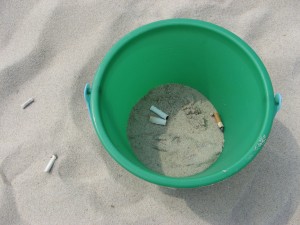The idea of protecting our Earth is slowly catching on with the increase in green products and services. There are so many small things that each individual can do to contribute to keeping Earth healthy.
This time of year on Long Beach Island is exciting as the warm days increase and the cold ones disappear. Many people start cleaning up their yards and cleaning off the lawn furniture so it’s ready when those warm days arrive.
Living and raising a family on Long Beach Island is special. It’s early spring and the kids already had some beach playtime. Let’s face it…Sand is fun! The kids can’t wait to run around on the beach and plop down and play in it.
My concern arises when my little ones start shoveling sand into their buckets and there are more cigarette butts than seashells in their little beach pails.

How big is the problem?
It is estimated that several trillion cigarette butts are littered worldwide every year. That’s billions of cigarettes flicked, one at a time, on our sidewalks, beaches, nature trails, gardens, and other public places every single day. In fact, cigarettes are the most littered item in America and the world.
Cigarette filters are made of cellulose acetate (plastic), NOT COTTON, and they can take decades to degrade depending on environmental conditions. The toxic residue in cigarette filters is damaging to the environment, and littered butts cause numerous fires every year, some of them fatal.
But beyond the plastic, the filters contain trace amounts of toxins like cadmium, arsenic and lead. When smokers discard their butts improperly, they are essentially tossing these substances into the environment.
What are the dangers of littered cigarette butts?
When it rains, the water carries cigarette butts and trash via storm drain systems and waterways right out to the ocean, where currents wash it up onto the beach.
In addition to polluting streets and beaches, plastic pieces, such as cigarette butts can pose a health hazard to animals. Marine animals can mistake butts as food. If plastic blocks their digestive track, animals may become ill or even starve. Animals can also become entangled in trash, which restricts their ability to eat, breath and swim, often with fatal results.
“ Cigarette filters have been found in the stomachs of fish, birds, whales and other marine creatures who mistake them for food … Composed of cellulose acetate, a form of plastic, cigarette butts can persist in the environment as long as other forms of plastic.”–Clean Virginia Waterways
People need to be educated of the negative impacts that cigarette butts have on the environment and animals. Each cigarette butt is so small, people don’t even think about the consequences of littering butts.
There is legislation that would ban smoking at beaches, amusement parks and racetracks in New Jersey but it is on hold and it’s not known when a vote may be scheduled. State Sen. Andrew Ciesla of Ocean County wants to prohibit smoking on state-owned beaches.
So, when you visit Long Beach Island, do your part in maintaining our beautiful beaches and keep them clean!
References:
The Daily Green – A Consumer’s Guide to the Green Revolution
N.J. beach-smoking ban is on hold

